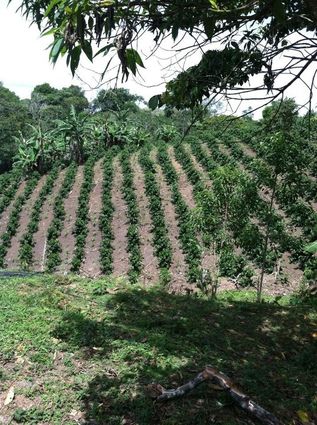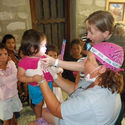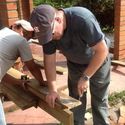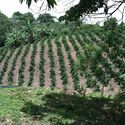Mission work: Life altering experience for all involved
Last updated 8/22/2012 at Noon
Doug Manning, Orange County Attorney, recently returned from a trip from Honduras which he says was a “life altering experience” and his journey is not over yet.
Manning’s step brother, Mark Fittz, is a missionary in Honduras and works for Camino Global. Along with his wife, Michelle, and their children, he lives at the Bible Seminary of Honduras located in Siguatepeque, Comayagua.
Mary Beth Rose, Manning’s step-sister, and her husband, who is the pastor at Community Church in Orange and other members of the church also went on the mission trip. Nina Lafeiste, a dentist and member of Community Church accompanied the group. A family from the Turning Point Church in Vidor went as well. Manning is a member of the North Orange Baptist Church. Although, the members of the mission team attend different churches, together they united for a good cause, which was to help the people of the Honduran community near where the seminary is located.
During Manning’s eight day trip he had several things he wanted to accomplish. At the top of the list, was to put a roof on a church for Pastor Allen. It is an adobe church built with HOPE Coffee money. The land was donated by a member of the church. The group Manning worked with built the trusses. The roof, when completed, would be a “butterfly roof” which would allow air to flow through and be able to catch the much needed rain water into a cistern. The collected rain water is then used to do things such as wash clothes.
Through necessity, Manning quickly learned to communicate with Spanish words for saw and hammer.
The church was completed by Saturday and by word of mouth the church was filled on Sunday with about 65 people. The church was initially made of adobe, but stucco will cover the walls once more money is raised. In addition, they have plans to build a soccer field in the field by the church. On Sunday afternoons following services, people and children play soccer. The old saying, “If you build it, they will come” may actually come true in this case.
“Handing a child a soccer ball to them is like handing them a bar of gold,” Manning said.
The foundation of the buildings is made of large rocks which are hauled by hand or in a wheel barrow up the mountainside and put into the trenches. Then concrete is poured over footings.
HOPE Coffee since it started in 2009 has helped many people. Fittz saw the need of encouraging international outreach through local U.S. churches. As members of the churches visited Honduras on their mission trips, they wanted a souvenir to take back with them. One of the most sought after souvenir was the Honduran coffee. Fittz then had the idea after recognizing the demand, to connect with the Honduran coffee farmers to purchase and roast premium coffee. As a result, “HOPE coffee” was born.
Fittz also connected with Honduran churches and partnered with them to identify community outreach projects which the proceeds would fund. Once the visitors tasted the coffee and realized it was more than just a souvenir and would impact the Honduran missions, they wanted to use it more often and share it with their friends, family, churches and businesses, according to information from HOPE coffee.
The money raised from the sales, goes 100 percent to the missions to help the community. It is broken down into three components; the costs of paying the farmers for the coffee beans, the costs of processing the beans with the remainder to fund the various projects.
“Every dollar is accounted for,” Manning said.
While there Manning saw first hand how the money from coffee sales is spent. Pastor Lenin, (pronounced LaNeen), who had a church at the edge of the dump to minister to the people who lived there was able to build with the funds.
“The church was planted with HOPE coffee money,” Manning said.
While there, Manning met a woman, Ana, who lived at the dump following the death of her husband. Without his income, the widow, her three children and her siblings were forced to live at the dump, which is known as a crematoria, in Siguatepeque. To make money she collected and sold glass bottles and profited about five cents per day.
Before Manning left, the layout and the foundation for Ana’s house began. The land and materials for the house were purchased with money from HOPE coffee. A team laid out the house and helped the masons which were also paid with funds from HOPE coffee. The size of the house may seem small by American standards since it will be about the size of one and half car garage, but to them it is simply a house to be proud of and a home.
“It is the goal of every Honduran to own a piece of land,” Manning said. “If you own land, you can have a home.” Manning said.
But, home ownership for some also means work for others who are struggling to make ends meet.
“Workers are paid more than the average market rate, which helps to raise their standard of living,” Manning said.
The average market rate is not considered much in the U.S. but in Honduras , it is $3 to $5 per day. But, when they work for the missions, they earn more than the average.
Many Hondurans travel many miles for the opportunity to earn the extraordinary pay. While they are working on the various projects a place to sleep after a hard day’s work is provided.
Most of the ladies in the group visited the local schools during the morning hours and had a vacation bible school, in a small town, San Francisco, in the afternoons. There were about 50 children in the VBS even though some had to walk several miles to get there.
During one the VBS days, it was discovered a lttle girl had broken her arm. The group was told the girl’s arm had been broken two or three times before, but had never healed properly because the family was too poor to have the surgery performed.
“We paid for the x-rays which were $35 and found out the surgery was going to be $1,000,” Manning said.
The missionaries passed around a hat and were able to raise $890. The surgeon then agreed to perform the surgery for $900. But, it was all the money they had. Pastor Daniel then pulled his pockets inside out in search of an additional $10. To everyone’s amazement, he found the extra money needed deep in his pocket and paid for the surgery.
“The nurse was the sister of the mother of the girl and could not believe this was happening,” Manning said. “They were told it was a gift from Jesus Christ.”

A coffee plantation in Honduras grows the coffee beans which will be bought by HOPE Coffee at a fair market value. It will then be processed and sold to fund the many projects for the ministries in Honduras.
While all the efforts were happening with the mission groups, Dr. Nina Leifeste was providing her own special touch to the locals with dentistry which they could not afford. She set up a clinic and saw more than 130 patients along with her assistant who was there from Turning Point Church in Vidor. Together they pulled more than 135 teeth during their week of service. Leifeste’s motto rings very true, “Creating smiles... changing lives....” which is exactly what she did.
Finally, no vacation is complete without a little fun. One Sunday afternoon after church they went to a local park and rode a zip line which goes about 100 feet above a waterfall that drops to more than 200 feet below.
“It was so beautiful,” he added.
For Manning, the work he did in Honduras was of love and his faith in God. He has plans to return and share the experience with his wife, Shelly, and their children.
For more information or to order HOPE coffee, go to http://www.hopecoffee.org.
Feature Photo:
Doug Manning works on building trusses for a building in Honduras during a recent misson trip. The electricity frequently goes out and he then has to reach for more conventional hand tools such as a hammer and saw instead of the power tools.

















Reader Comments(0)